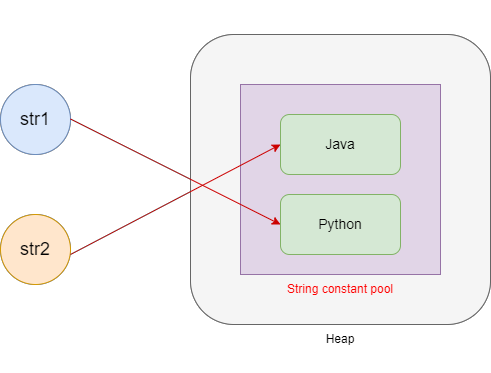Why Are Strings Immutable in Java? Best Practices and Use Instances
Why Are Strings Immutable in Java? Best Practices and Use Instances
Blog Article
Checking Out the Advantages of Unalterable Strings in Modern Programs Paradigms
In the realm of contemporary shows standards, the concept of immutable strings stands as a cornerstone of durable software application advancement. The advantages they offer surpass mere convenience; they essentially change the means information is handled within applications. By adopting unalterable strings, programmers can ensure boosted data stability, boosted string safety, simplified debugging procedures, increased safety and security measures, and effective performance optimization. These benefits function as a testimony to the profound impact that accepting immutability can have on the reliability and performance of software program systems.
Enhanced Information Stability

By avoiding the adjustment of string things, immutability removes the danger of unintended adjustments to the information they hold. This not only improves the safety and security of the details yet additionally boosts the reliability of the code that counts on these strings.
Immutability also supports much safer multithreading settings, as concurrent access to immutable strings does not present the threat of information corruption with simultaneous modifications. This home streamlines the procedure of dealing with strings in parallel shows circumstances.
Basically, immutability works as a safety guard around the information kept within strings, boosting their integrity by making certain that as soon as defined, their values continue to be unchanged throughout the program's execution.

Boosted Thread Safety And Security
Unalterable strings improve the thread safety and security of programs by ensuring that as soon as a string item is created, its value can not be modified. This property eliminates the danger of simultaneous threads trying to customize the very same string concurrently, which could lead to information corruption or irregular states in the program - Why are strings immutable in Java?. In a multi-threaded setting, where multiple strings accessibility and manipulate information concurrently, the immutability of strings offers a level of safety and security by ensuring that the data remains unmodified throughout its lifecycle
Simplified Debugging Procedures
Given the boosted string safety promoted by unalterable strings, a considerable advantage emerges in the realm of streamlined debugging processes. Immutable strings, once produced, can not be changed, making it much easier to trace the circulation of information and identify the resource of bugs in a program. This immutability makes sure that strings stay constant throughout the implementation of the program, reducing the probability of unforeseen adjustments that might result in errors.
When debugging with mutable strings, programmers typically come across issues where a string's worth is changed unintentionally, making it challenging to determine the source of a bug. Nevertheless, with immutable strings, the data remains unchanged, enabling developers to focus on assessing the actual reasoning of the code as opposed to finding where and when a string was changed improperly.
Furthermore, unalterable strings simplify website here the debugging procedure by allowing simpler reproduction of bugs. Since immutable strings do not transform state, designers can recreate and research bugs a lot more successfully, leading to quicker identification and resolution of concerns within the codebase. This streamlined debugging operations inevitably contributes to greater software application high quality and enhanced general development efficiency.

Increased Security Actions
Enhancing information protection and fortifying system stability, the utilization of immutable strings in software application applications adds dramatically to raised safety procedures. Immutable strings likewise play a vital role in avoiding common protection vulnerabilities such as barrier overflows and SQL shot attacks, as efforts to control string information at runtime are naturally restricted.
Additionally, the immutability of strings improves the predictability of program habits, making it easier to verify inputs and avoid unanticipated modifications that can jeopardize protection. This predictability streamlines the process of bookkeeping and confirming code, making it possible for designers to determine prospective protection technicalities extra successfully. On the whole, integrating unalterable strings into software development methods not just boosts the toughness and integrity of applications however likewise enhances their resilience versus safety hazards.
Effective Performance Optimization
Building upon the foundation of raised safety steps achieved via the use of immutable strings, a click reference crucial facet to take into consideration in software program growth is reliable performance optimization. When managing mutable strings, procedures like concatenation or substring creation usually cause the creation of new string things, leading to memory overhead and increased handling time. Nonetheless, with unalterable strings, these operations can be maximized to improve performance. By permitting strings to remain consistent and unchangeable, immutable strings help with better memory administration and caching opportunities, inevitably improving the overall efficiency of the software.
Immutable strings also play an essential role in multithreaded environments by advertising thread safety. Why are strings immutable in Java?. Since unalterable strings can not be customized when produced, they can be shared across threads without the threat of unforeseen modifications, lowering the demand for synchronization systems and enhancing concurrency. Additionally, immutable strings streamline debugging processes as designers can trust that a string's worth will continue to be consistent throughout the program's execution, removing possible errors triggered by mutable state adjustments. In verdict, the use about his of immutable strings not just boosts protection yet also significantly adds to the effective performance optimization of modern software application systems.
Verdict
To conclude, the advantages of making use of unalterable strings in modern programming paradigms can not be overemphasized. Improved information stability, improved string safety and security, simplified debugging processes, boosted security steps, and reliable performance optimization all add to the general effectiveness of programs jobs. By incorporating unalterable strings right into shows techniques, developers can take advantage of an extra robust and reliable codebase.
Immutability, an essential attribute of strings in programming languages such as Java and Python, makes certain that when a string item is created, it can not be altered or modified.Unalterable strings improve the thread safety and security of programs by ensuring that once a string item is created, its value can not be changed. Unalterable strings additionally play a crucial function in protecting against typical safety and security vulnerabilities such as barrier overflows and SQL shot assaults, as attempts to control string information at runtime are naturally restricted.
By permitting strings to continue to be constant and unchangeable, immutable strings promote better memory monitoring and caching possibilities, ultimately increasing the overall performance of the software.
Unalterable strings simplify debugging processes as designers can trust that a string's value will certainly remain consistent throughout the program's implementation, eliminating possible mistakes caused by mutable state adjustments.
Report this page